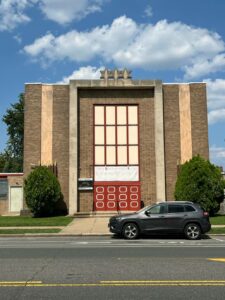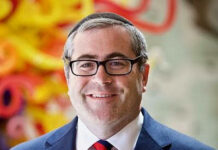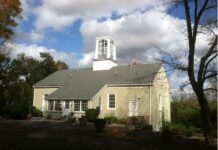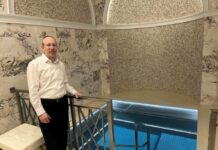
If you Google Temple Menorah-Keneseth Chai, you find an address on Tyson Avenue in Northeast Philadelphia. And if you drive over to the Tacony neighborhood and park near the tall building with three Stars of David on top, you will see a Temple Menorah-Keneseth Chai banner hanging above the front doors.
But the synagogue is no longer there. Over the Rainbow Early Learning Center is. The day care bought the building from the synagogue before the pandemic.
As Google suggests though, Temple Menorah-Keneseth Chai is still alive. Once a month on a Saturday, a small group of members meets upstairs in the sanctuary for a Shabbat service. Every other week, congregants gather for the Sabbath on Zoom.
There is still a part-time rabbi, Robyn Frisch, and cantor, Joel Manon, to pay. A popular neighborhood thrift shop run by the shul, the Sisterhood Thrift Shop, covers that.
“We love it,” said Sheila Dressner, the temple’s president, of the 98-year-old place. “I’ve always been welcomed from the first minute I walked in.”
Dressner first walked through the doors in 1980. She wanted her daughters to have a place to go for their bat mitzvahs. Both girls celebrated the arrival of their Jewish womanhood there. Dressner’s older daughter, Joann Baumgarten, had her wedding at the synagogue, too.
“Whenever I go into the synagogue, it’s a comfortable feeling,” Dressner said.
When the current president joined, Temple Menorah-Keneseth Chai had hundreds of members. High Holiday seats were full. There was a Hebrew school. There were art shows in the auditorium that attracted hundreds of people. The shul that opened in 1925 after some Jewish merchants got together to build a place to pray was still thriving seven decades later.
But over time, Jews moved out of the city and into the suburbs. Congregants got older. Some died. Others went into nursing homes. Some moved to Florida. Then, COVID forced the remaining members to leave the building. Zoom emerged as a more convenient option for Shabbat services.
Today, about 70 members remain. Fewer than 20 join Zoom services each week. Some pre-COVID activities, like dinners and trips to Atlantic City and Wildwood, are no longer.
Most congregants live outside of the Tacony neighborhood. Some reside in other Northeast Philadelphia neighborhoods. A couple live in Willow Grove, Montgomery County. Many have gone into the Paul’s Run Retirement Community on Bustleton Avenue.
The temple had to sell its building because it no longer had enough people to pay its bills.
“With a large congregation, you can repair the roof,” Dressner said. “With a smaller congregation, you cannot repair the roof.”
As the membership has dwindled, the schedule has gotten lighter. The temple used to have services every Friday night and once a month on Saturday with “a beautiful kiddush,” Dressner said. Now, “a lot of us can’t drive at night,” she added.
But on July 22, the congregation held its in-person Shabbat service for the month. People came. They sang.
“I said to the rabbi and cantor, ‘For a small crowd, we make a lot of noise,’” Dressner recalled.
Frisch, the synagogue’s spiritual leader since 2008, guided that service like she always does. She said it was “nice to see everyone.”
Temple members still give each other rides to places. One time recently, a woman needed treatments for cataracts. Her husband couldn’t drive her. Another congregant did.
“People step up for each other,” Frisch said.
Frisch admitted that when she started 15 years ago, she never expected the temple to last this long. But it has.
“For so many people, this has been their community for 60 or 70 years,” she said.
Dressner hopes to keep it going until its 100th birthday in 2025. Before the pandemic, congregants would celebrate the synagogue’s anniversary at the Philmont Country Club in Montgomery County. They would talk about how they were so happy that the temple was still in existence.
People often ask Dressner where she observes the High Holidays. She answers, “Temple Menorah-Keneseth Chai.” The response is usually the same: “Oh, that’s still around?”
“It would mean that we existed for at least 100 years. A synagogue that is cherished and loved would still be in existence,” Dressner said. “I want it known that we have been here for at least 100 years.”






